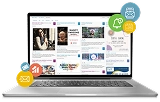
Event Marketing Planning: Expert Tips plus Free Template
While event marketing planning may seem challenging, there are several efficient and easy-to-implement approaches and technologies available to help. Indeed, from event website to social media and email marketing, there are many options to consider while developing your event marketing plan. Check out these key event promotion strategies to easily promote your events. Plus a bonus event marketing checklist template for you to use when planning your next event!
I. What is an Event Marketing Plan?
An Event Marketing Plan is a strategic roadmap designed to promote an event, attract the right audience, and achieve specific goals. Further, those could be brand awareness, lead generation, or sales targets. It outlines the steps and tactics necessary to create buzz, engage attendees, and ensure the event's success.
That is, from defining objectives and key performance indicators (KPIs) to identifying the target audience, crafting compelling messaging, and utilizing multiple marketing channels, an event marketing plan helps align all promotional efforts. By following a structured plan, businesses can maximize event impact, track performance, and refine their strategy for future events.
Writing an event marketing plan for each and every one of the events you organize is a necessary step. Putting all our event promotion ideas on paper, and laying out in detail how you will apply the selected event marketing strategies can help you create a feasible action plan. In addition, it can help you evaluate your performance so you can make your next event even better!

II. Key Elements of Event Marketing Planning
How do you start your event marketing planning? To help you out, we've outlined the essential elements of an effective event promotion strategy, along with practical tips for implementation. Further, by using these strategies, you can ensure your event attracts the right audience and meets your goals.
Later in this post, you'll also be able to download a free event marketing plan checklist that you can use as an example or template. It will help you through each step of the event marketing planning process.
1. Set Clear Goals and Define KPIs
The foundation of any successful event marketing plan starts with well-defined goals. This is why this step is the first one in our event marketing checklist template. So, ask yourself what you want to achieve with this event. Is it about increasing brand awareness, generating leads, or creating opportunities for networking? Furthermore, defining these objectives will shape your marketing efforts.
Once you’ve set your goals, it’s important to determine the Key Performance Indicators (KPIs) you’ll use to measure success. These KPIs might include:
- Website traffic
- Number of registered attendees
- Engagement on social media
- Lead generation or conversions
- ROI (Return on Investment) from marketing spend
By establishing specific, measurable goals, you’ll have a clear roadmap for your event marketing strategy and can track your progress effectively.
2. Identify and Segment Your Target Audience
Successful events depend on attracting the right audience. Hence, knowing your target audience is crucial in creating an event marketing plan that resonates with them. Therefore, start by identifying the key demographics, behaviors, and interests of potential attendees. Are they industry professionals? Students? Executives?
Once you’ve defined your audience, you can further segment them into smaller groups based on factors such as:
- Age
- Location
- Job title
- Industry
- Previous interactions with your brand
Segmentation allows for more personalized communication and targeted marketing campaigns. Furthermore, tailoring your messaging to speak directly to each audience group will increase the likelihood of engagement and registration.
3. Craft a Compelling Marketing Message
Your marketing message is the backbone of your event promotion. Therefore, it should clearly convey the value of the event to potential attendees. Think about what makes your event unique. Is it the high-profile speakers? The exclusive networking opportunities? The practical takeaways?
Highlight the event’s unique selling points (USPs) and frame them in a way that addresses your audience's pain points or interests. When developing your event marketing plan, craft a succinct, compelling message that emphasizes the benefits of attending. Further, effective event marketing planning ensures that your messaging resonates with the audience and showcases the event's value.
For example, instead of simply promoting a conference as “an opportunity to learn,” try something more targeted, such as “Gain actionable insights from industry leaders to boost your business growth.”

4. Develop an Event Marketing Plan Content Strategy
Content is essential for building awareness and engagement, so we've made it a central step in our event marketing checklist template. Indeed, adding a content strategy to your event marketing plans allows you to consistently promote your events across various platforms and keep your audience engaged throughout the campaigns.
Here are a few content types to consider for event marketing:
- Blog Posts: Write about topics related to your event that will pique interest in your audience.
- Social Media Posts: Share event updates, countdowns, speaker spotlights, and behind-the-scenes content.
- Email Campaigns: Create a sequence of email messages to nurture leads, provide event updates, and encourage registrations.
- Videos: Use video content to showcase event highlights, speaker interviews, or testimonials from past events.
- Infographics: Visual content is highly shareable and can effectively convey important details about the event.
The key is to produce content that adds value to your audience, keeps them engaged, and motivates them to register for your event.
5. Leverage Email Marketing
Email marketing remains one of the most effective tools for event promotion. Further, it allows for direct communication with your audience and provides an opportunity for personalized engagement.
Create targeted email campaigns with segmented lists as part of your event marketing planning. Here are some ideas for email content:
- Event announcement emails
- Registration reminders
- Speaker introductions
- Early bird pricing promotions
- Last-minute offers to boost attendance
Personalize your emails as much as possible by using the recipient’s name, mentioning their previous interactions with your brand, or offering special discounts based on their past attendance at your events.
6. Promote Your Event on Social Media
Social media is an essential platform for event marketing, providing a space for real-time interaction, engagement, and sharing. Therefore, create event pages or groups on platforms like Facebook or LinkedIn, and actively post updates and promotional materials.
Consider these tips to maximize your social media efforts as part of your event marketing plan:
- Use event-specific hashtags to generate buzz.
- Engage with potential attendees by replying to comments, sharing their posts, and encouraging them to share the event with their networks.
- Run paid social media ads to target specific audiences and increase event visibility.
- Partner with influencers or industry experts to promote the event to a wider audience.
Remember to stay active on social media leading up to the event, and don’t forget to share live updates during the event to keep the momentum going.
7. Invest in Paid Advertising
While organic reach is important, paid advertising can provide a significant boost to your event promotion. That's why we've included this crucial step in our event marketing checklist template. Online ads on platforms like Google, Facebook, and LinkedIn allow you to reach a targeted audience and increase your event’s visibility.
When using paid advertising in your event marketing plans, focus on crafting highly targeted campaigns that match your audience’s interests and behaviors. For instance, a Facebook ad campaign can be customized to target users based on their job title, location, or browsing habits.
Paid ads also allow for precise performance tracking, so you can optimize your campaigns and adjust your budget for maximum impact.
8. Engage Influencers and Media Outlets
Collaborating with influencers and media outlets can help amplify your event’s reach. Since, industry influencers and bloggers can endorse your event to their followers, providing a level of credibility that can attract more attendees.
Reach out to relevant media outlets and industry publications as part of your event marketing planning to feature your event in their articles, blogs, or newsletters. Lastly, the more exposure your event gets through trusted sources, the higher the chances of attracting interest and registrations.
9. Optimize Your Event Landing Page
Your event’s landing page is the hub of all your marketing efforts. Since, this is where potential attendees will go to learn more about the event and (hopefully) register. Therefore, it’s critical to ensure that your landing page is clear, concise, and optimized for conversions.
Here are some elements to consider:
- Compelling headline and value proposition: Make sure visitors instantly understand the benefits of attending.
- Easy registration process: Don’t make users jump through hoops to register. Keep the registration process simple and user-friendly.
- Engaging visuals: Use images, videos, and graphics to make your page visually appealing.
- Mobile optimization: Ensure that the page is fully optimized for mobile users, as many attendees will likely visit via their smartphones.

10. Plan Your Event Promotion Timeline
Timing is crucial in event marketing. As part of your event marketing planning, create a detailed timeline that outlines when and where each marketing activity will occur. This ensures your efforts are well-coordinated and reach your audience at the optimal moments.
A strategic timeline should include:
- Early promotions (months before the event)
- Ramp-up marketing (a few weeks before the event)
- Last-minute marketing efforts (days leading up to the event)
This structured approach ensures that you’re consistently promoting your event and keeping it top of mind for your audience.
11. Maintain Consistent Event Branding
Brand consistency is essential for event marketing. All of your marketing materials—whether it’s social media posts, email designs, or the event landing page—should reflect the same branding, including your logo, colors, and fonts.
Cohesive branding across all platforms not only makes your event look more professional but also reinforces brand recognition, making it easier for your audience to remember your event.
12. Personalize Your Communication Techniques
Personalization in event marketing can significantly boost engagement, which is why we've made it a key step in our event marketing checklist template. As part of your event marketing plan, tailor your communication based on the audience segment or individual preferences.
For example:
- Send personalized emails with unique subject lines.
- Offer exclusive discounts to specific groups (e.g., early registrants or past attendees).
- Customize messaging on ads or landing pages based on user behavior.
Personalization creates a more meaningful connection with potential attendees and can significantly boost registration rates.
13. Offer Event Engagement Previews
Create excitement by offering sneak peeks of what attendees can expect. Highlight key speakers, exciting sessions, or special networking opportunities in your promotions. Offering exclusive content or early access to event materials can also create a sense of urgency for people to register sooner.
14. Post-Event Marketing and Follow-Up
Your marketing efforts shouldn’t end when the event does. Post-event marketing is key to maintaining momentum. Share event highlights such as photos, videos, and attendee testimonials. Create a recap blog or video to engage with those who couldn’t attend, and promote any on-demand sessions.
After the event, your event marketing planning should include a follow-up email to thank attendees and encourage ongoing engagement with your brand for future events.
15. Evaluate Your Event Marketing Plan Performance
Review the performance of your marketing effort to assess the effectiveness once the event concludes. Analyze the metrics associated with your marketing campaigns, such as website traffic, conversion rates, and social media engagement. This evaluation will help you understand what worked well and what needs improvement for your future event marketing strategies.
In sum, event marketing planning requires a strategic approach and a lot of coordination, but with the right tools and techniques, you can create a buzz around your event and drive meaningful engagement. Whether you’re targeting industry professionals, businesses, or consumers, following these key elements will ensure your event is not only well-promoted but also well-attended.
III. Free Event Marketing Plan Template
As we all know, planning a successful event requires more than just setting a date and sending invitations. It involves strategic marketing efforts to ensure your event reaches the right audience and achieves its goals.
To help you stay on track, we’ve created a comprehensive Event Marketing Plan Template that covers all the essential steps, from setting clear goals to evaluating your post-event performance. Further, this checklist will guide you through every stage of the process, ensuring you don’t miss a thing.
Ready to supercharge your event marketing strategy? Claim your free template and start planning your next event with confidence!
Claim your free template:
IV. How Can Timely Boost Your Event Marketing Strategies?
Timely's event management software is a top choice for event professionals worldwide, offering a sleek, customizable calendar seamlessly integrated into your website. Designed to blend effortlessly with your site, Timely's white-label events calendar can be fully personalized with your company’s branding and logo, making it feel uniquely yours.
But Timely doesn’t stop at event calendaring—it’s a powerful tool for enhancing your event marketing strategies, too. You can easily create email campaigns and automate their timing, whether it's a confirmation email with event details, a follow-up with additional information, or a friendly reminder as the event date approaches. With Timely, you can easily check off every item on your event marketing checklist.
No more juggling between spreadsheets or relying on third-party platforms with limited ticketing management. With Timely, you can download attendee lists, manage billing accounts, and control every aspect of your event directly from your Timely account.
Time.ly has been recognized as a leading event registration software, trusted by over 150,000 organizations worldwide to streamline their event planning and registration processes. Therefore, if you're looking to streamline your event marketing efforts and manage everything efficiently without needing a large team, Timely is your ideal solution.
Get in touch with us to learn more about our comprehensive software today!





